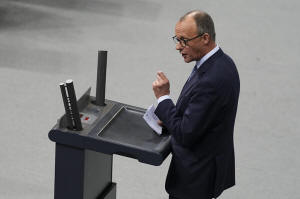German parliament expected to vote on migration bill that could pass
with far-right support
 Send a link to a friend
Send a link to a friend
 [January 31, 2025]
By GEIR MOULSON [January 31, 2025]
By GEIR MOULSON
BERLIN (AP) — Germany's parliament is expected to vote Friday on an
opposition bill calling for tougher rules on migration that could become
the first legislation to pass thanks to a far-right party — adding to a
controversy about the attitude of the front-runner in Germany's upcoming
election toward the far right.
Opposition leader Friedrich Merz has put demands for a more restrictive
approach to migration at the center of his campaign for the Feb. 23
election since a deadly knife attack last week by a rejected
asylum-seeker.
The way he has done so has prompted opponents to question his commitment
to upholding mainstream parties' “firewall” against the far-right
Alternative for Germany, or AfD, and triggered protests, though he
insists his position is unchanged and that he didn't and won't work with
the party.
On Wednesday, Merz put a nonbinding motion to parliament calling for
Germany to turn back many more migrants at its borders, insisting that
decisions are needed now regardless of who supports them. The measure
squeaked through thanks to the support of the far-right party, a first
that drew a rare public rebuke from ex-Chancellor Angela Merkel, a
former leader of Merz's party.
On Friday, months-old legislation proposed by Merz's center-right Union
bloc that calls for an end to family reunions for migrants with
protection status that falls short of full asylum is scheduled to go to
a vote. It also would give federal police increased powers to carry out
deportations. The center-left governing parties have said they will
reject the “influx limitation bill,” while a combination of opposition
parties, including AfD, is in favor.

[to top of second column]
|

German opposition leader and Christian Union parties floor leader
Friedrich Merz speaks after the debate and a voting about migration
at the German parliament Bundestag in Berlin, Germany, Wednesday,
Jan. 29, 2025. (AP Photo/Markus Schreiber)

It's uncertain whether it will pass. And its chances of actually
becoming law look uncertain at best. It would need approval from
parliament's upper house, which represents Germany's 16 state
governments, and that looks doubtful.
But the maneuver has added to a growing divide between Merz's bloc,
Chancellor Olaf Scholz's center-left Social Democrats and their
remaining coalition partners, the environmentalist Greens — parties
he may need to form a governing coalition after the election.
Polls show Merz’s Union leading with around 30% support, while AfD
is second with about 20%, and the Social Democrats and Greens are
further back.
Center-left parties have accused Merz of breaking a political
consensus to shun the 12-year-old AfD, which first entered
parliament in 2017 — benefiting from Merkel's decision two years
earlier to allow large numbers of migrants into the country. Scholz
has suggested that Merz can no longer be trusted not to form a
government with AfD, an accusation that Merz has angrily rejected.
Merz insists that he has sought majorities in the political center.
The center-left parties have pointed the finger back at him, noting
that he said there could be no compromises on his proposals.
All contents © copyright 2025 Associated Press. All rights reserved |